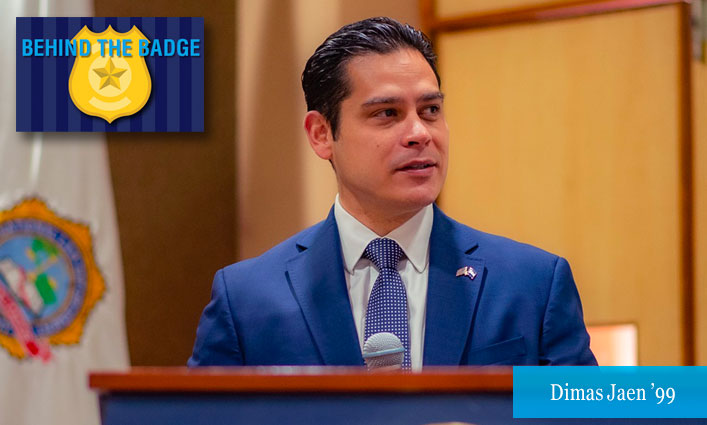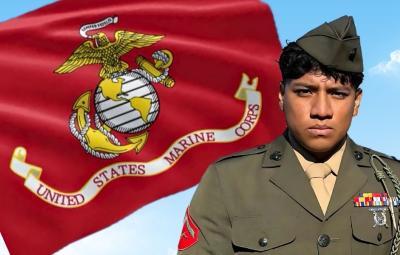
Since its inception, John Jay College has been an institution proud to educate public safety leaders in law enforcement, fire suppression, and emergency medical services. Every day, these brave members of our community work hard to keep us safe. We’re continually grateful for their service, and in recognition of their considerable contributions to our safety, we’re dedicating our “Behind the Badge” series to them. In these articles we get to see the man or woman “behind the badge.” We get to know what inspires them, understand what challenges them, and most importantly learn about their jobs through their own thoughts and experiences.
Diplomatic Security Service Supervisory Special Agent Dimas Jaen ’99, Acting Director of the International Law Enforcement Academy (ILEA) San Salvador in El Salvador, has had a 20-year career in law enforcement worthy of being a blockbuster film. Working with the U.S. Department of State’s Bureau of Diplomatic Security, he’s traveled across the globe and been embedded in some of the most conflict-ridden regions of the world; he’s protected foreign leaders and dignitaries; he’s taken down ISIS cells; and he’s taken part in U.S. citizen kidnap recoveries. But the moments of his career that seem to leave the biggest impact on Jaen are when he gets to be a teacher and mentor, helping to guide the next generation of law enforcement to successful, fulfilling careers. Now, as Acting Director of ILEA San Salvador, he’s getting to do that daily. “At ILEA San Salvador our students are mid-level law enforcement agents, from across 34 countries in the western hemisphere,” he explains. “Seeing them expand their skill sets, make international connections, and progress in their careers is really rewarding.”
Sponsored, administered, and funded by the U.S. Department of State’s Bureau of International Narcotics and Law Enforcement Affairs (INL), the network of International Law Enforcement Academies (ILEAs) “combat international drug trafficking, criminality, and terrorism through strengthened international cooperation.” As part of the network of ILEAs throughout the world, ILEA San Salvador provides training and capacity-building for law enforcement professionals in Latin America and the Caribbean. “We train police, prosecutors, and judges on a variety of topics, everything from tactical, for example room entry, defensive tactics, arrest techniques; to technical skills like money-laundering, cybercrimes, and crypto-currency investigations; to management and leadership development like our Leadership for Women in Law Enforcement course, which I'm especially proud of," shares Jaen.

As an education hub, ILEA San Salvador isn’t just training law enforcement professionals, it’s also the venue for important criminal justice-focused conversations to take place. Recently ILEA San Salvador hosted John Jay professors Deborah Koetzle, Ph.D., Jeff Mellow, Ph.D., and Verónica Michel, Ph.D., while they held meetings with local experts and continued work on their INL-funded project, which will see them survey prisoners in Guatemala, El Salvador, Honduras, and Panama. “We really appreciate the support of our project,” says Koetzle. “The ILEA San Salvador facility is amazing and what was really exciting was knowing that the new director was a John Jay alumnus. Director Jaen took the time to meet with us and share stories of his career, from his early days at John Jay to his current position. It certainly provided a great sense of pride for us.” We recently chatted with Director Jaen to learn more about his fascinating career in law enforcement, his role at ILEA San Salvador, and the goals he has for his students.
Who or what inspired you to embark on a career in law enforcement?
I was kind of born into it. I come from a very service-oriented family and grew up hearing stories about how rewarding a career in the military and law enforcement is, so I’ve always been drawn to a career focused on serving the community and our country. My dad served in the U.S. Army, and then the Army National Guard. My grandfather, on my mother’s side, was a veteran who served during the Korean War. And my brother is an Iraq War veteran and has worked for 20 years as a police officer. I also have aunts, uncles, and cousins who have all worked in public service in one form or another, whether it’s in the military, federal service, or local law enforcement. So, for me, it’s a natural fit.
You started your international law enforcement career with the Bureau of Diplomatic Security where you conducted criminal investigations and provided security and protection to foreign dignitaries. How did you come to serve in that role?
Straight out of John Jay, I started working as an investigator with the Department of Buildings in New York City, in the Investigations and Audits Division. I started there knowing that I wanted to go into law enforcement. I applied for several different federal law enforcement jobs, including the FBI, the DEA, and Diplomatic Security. The reason I chose Diplomatic Security was because I wanted to go overseas. I wanted to experience that lifestyle, the position with diplomatic security, and the life of a foreign service special agent. The Diplomatic Security Service is one of the lesser-known federal law enforcement agencies, but I can tell you, it’s the best gig in the federal government. We are the face of the U.S. government internationally.
“The really cool thing about working in Diplomatic Security is that there are no typical days. There are no typical assignments. Change is the name of the game in Diplomatic Security.” —Dimas Jaen
Working in Diplomatic Security, what was a typical day like for you?
The really cool thing about working in Diplomatic Security is that there are no typical days. There are no typical assignments. Change is the name of the game in Diplomatic Security. On any given day you’re doing something new and you’re learning something new. Initially, during my first tour in the New York Field Office, I focused on the investigative aspect of the work, doing work with various task forces including the Violent Crimes Task Force and the U.S. Marshal Fugitive Task Force. But the job also required the protection of foreign dignitaries, and I very quickly found myself working a lot of protection. In New York, we have the United Nations General Assembly every year, where we have visiting foreign dignitaries that we provide security details for. That protection work transferred internationally when I transitioned to overseas work and volunteered to serve on temporary duty assignments for President Hamid Karzai’s security detail in Kabul, Afghanistan.
Looking back at your career with Diplomatic Security, can you describe your best day on the job?
I think anybody who’s worked in law enforcement for as long as I have will have a hard time pinning down a single event or one moment. For me, it’s any number of different moments. Helping to dismantle an ISIS cell that was targeting our diplomats overseas was hugely rewarding. The successful rescue and recovery of an American citizen, a two-year-old girl who was kidnapped in Guatemala, was tremendously rewarding. Even the more ordinary moments, where I’ve trained and mentored new and junior agents on the job, were incredibly gratifying.
What have been the most challenging aspects of your career in law enforcement?
In Diplomatic Security we rotate assignments every few years and we’re required to do an overseas assignment every six years, sometimes in conflicted, non-permissive environments. That can be challenging because just as you are getting your feet wet in a particular assignment and settling in, it’s time to move on. Learning something new and doing something new is exciting and keeps things fresh, but it can also be a challenge. It can be a challenge for an agent as an individual, and it’s certainly very challenging on family life. But for me, the rewards and experience have made the challenges worth it.
“At John Jay, I had amazing professors who weren’t just teaching from a set curriculum or a textbook, they were also teaching from their personal experiences. As the leader of an international law enforcement academy, I try to bring that to our style of teaching.” —Dimas Jaen
Are there any lessons from your time as a student at John Jay College that you’re bringing into your work now at ILEA San Salvador?
What I loved most about my time at John Jay was that the professors brought a tremendous amount of real-world experience to their courses. At John Jay, I had amazing professors who weren’t just teaching from a set curriculum or a textbook, they were also teaching from their personal professional experiences. As the leader of an international law enforcement academy, I try to bring that to our style of teaching. I invite course instructors from a variety of different law enforcement organizations. We have instructors from the FBI, the Secret Service, Homeland Security, even Fish and Wildlife. We’re making sure that part of the culture that we’re building here at ILEA San Salvador is that you’re not just teaching a curriculum, you’re teaching experience.
What do you hope students take away from their learning experience at ILEA San Salvador?
Obviously, we want them to take what they’re learning in their courses to their home agencies and home countries. But beyond that, we’re trying to build a culture that is collaborative and cooperative across international borders. So that the narcotics agent that I’m training from, let’s say for example, Saint Kitts, can work with their colleague in the Dominican Republic, who can then work with their colleagues in Panama. It’s about building those connections and establishing that coordination and cooperation. Building those transnational relationships will ultimately help us combat transnational organized crime and drug trafficking.
“Being in law enforcement is a calling. It’s not just a job. It’s a call to serve your community and to serve your country.” —Dimas Jaen
What advice would you give to future law enforcement officers?
Being in law enforcement is a calling. It’s not just a job. It’s a call to serve your community and to serve your country. The advice I would give to my colleagues, especially in this time where being in law enforcement is not an easy thing to do, is to be a leader and a mentor. Teach the newer officers and agents coming onto the job the right way to do things. Remind them of why it is we do the job that we do. Despite the difficulties that we face every single day out there, we are here to serve. We’re here to serve our communities. We’re here to serve our country and our families, and we need to keep our focus on that.



